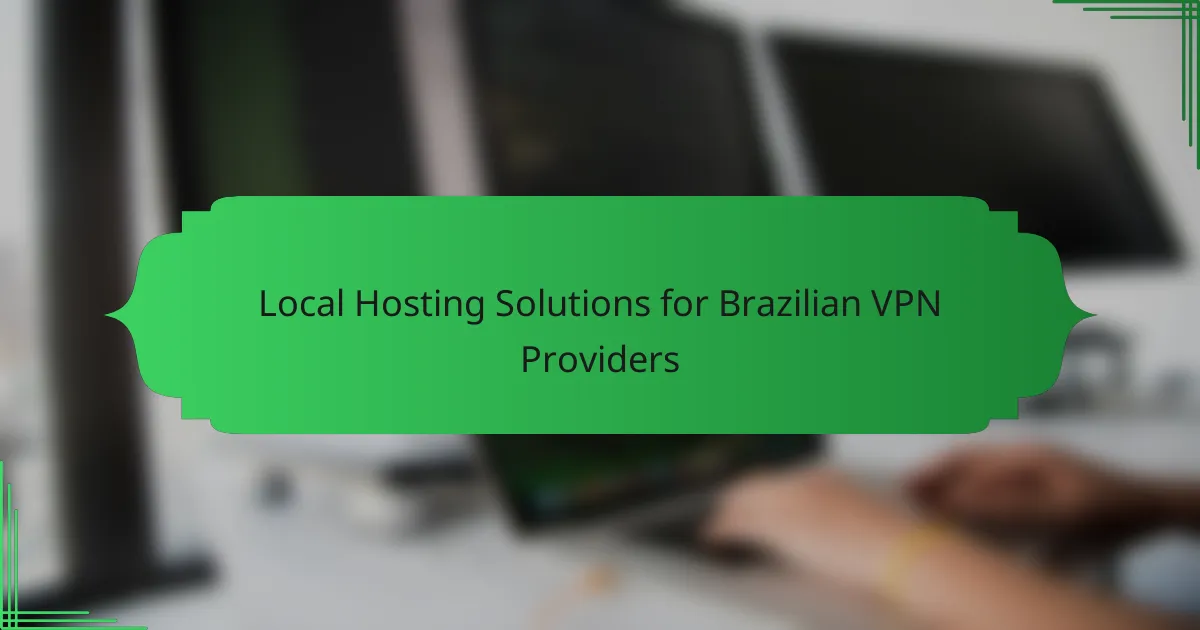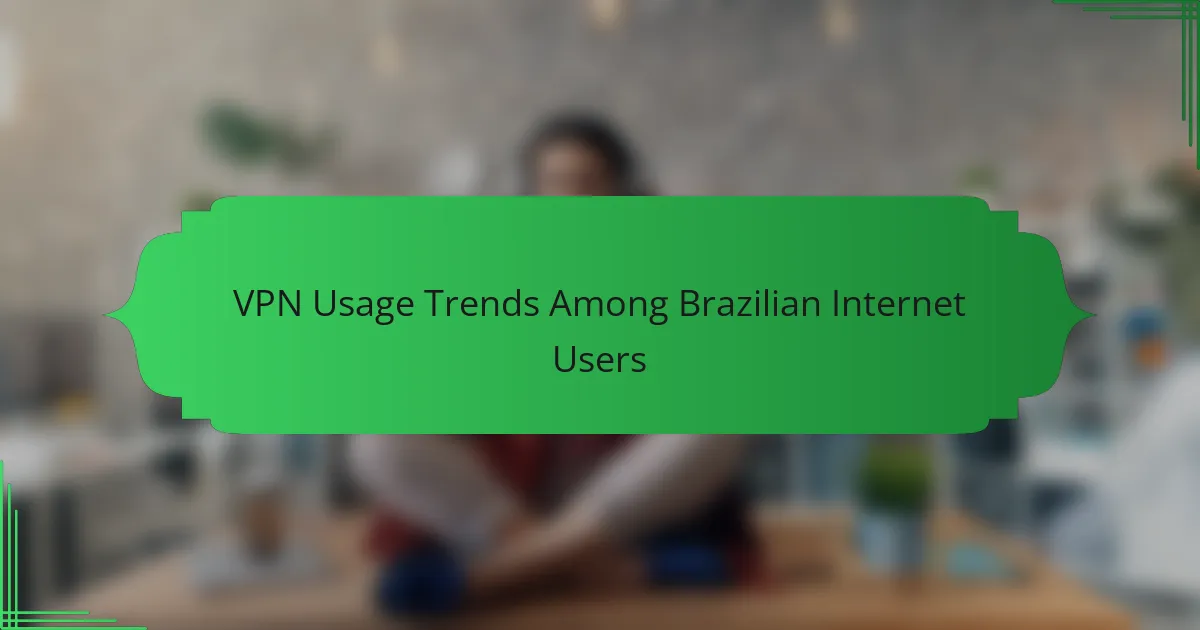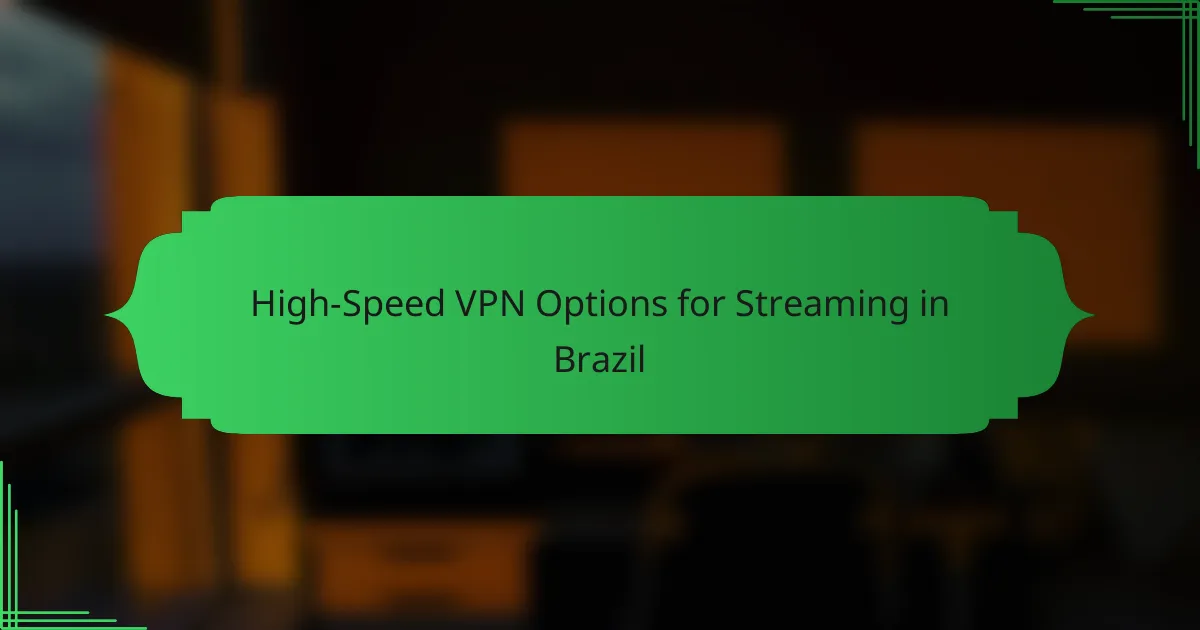Local hosting solutions are essential for Brazilian VPN providers, offering enhanced performance, compliance with local regulations, and competitive pricing. By utilizing these services, providers can reduce latency, ensure adherence to data protection laws, and improve user privacy, ultimately leading to a better overall experience for their customers.
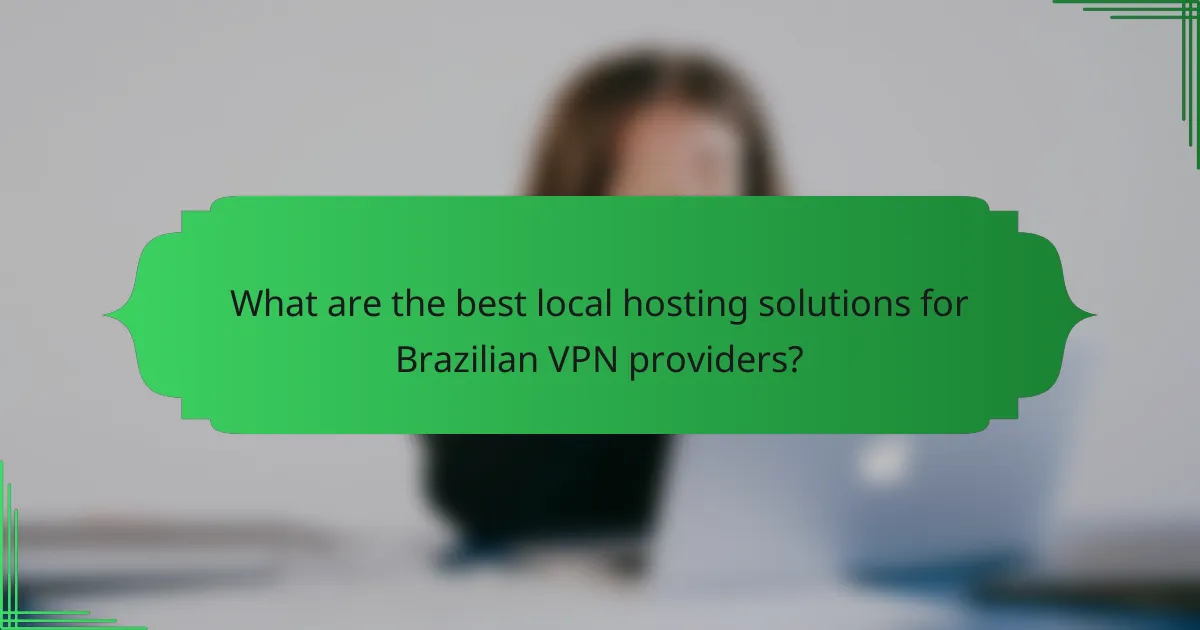
What are the best local hosting solutions for Brazilian VPN providers?
Brazilian VPN providers can benefit from several local hosting solutions that offer reliable performance, compliance with local regulations, and competitive pricing. Key options include major cloud services and specialized local hosting companies that cater to the unique needs of the Brazilian market.
Amazon Web Services (AWS) Brazil
Amazon Web Services (AWS) offers a robust cloud infrastructure in Brazil, providing services like EC2 for virtual servers and S3 for storage. With data centers located in São Paulo, AWS ensures low latency and high availability for VPN services.
Brazilian VPN providers should consider the pay-as-you-go pricing model, which allows for scalability based on demand. However, managing costs can be tricky, so monitoring usage is essential to avoid unexpected charges.
Google Cloud Platform (GCP) Brazil
Google Cloud Platform (GCP) operates data centers in São Paulo, offering a range of services suitable for VPN providers, including Compute Engine and Cloud Storage. GCP is known for its strong security features and advanced networking capabilities.
Providers should leverage GCP’s flexible pricing options and consider using committed use contracts for cost savings. It’s important to evaluate the specific features needed for VPN operations, such as load balancing and private networking.
Locaweb Hosting Services
Locaweb is a prominent Brazilian hosting provider that offers dedicated servers and cloud solutions tailored for local businesses, including VPN services. Their infrastructure is optimized for Brazilian users, ensuring compliance with local data protection laws.
VPN providers can benefit from Locaweb’s competitive pricing and localized support. However, they should assess the scalability of Locaweb’s services to ensure they can grow alongside their user base.
HostGator Brazil
HostGator Brazil provides shared, VPS, and dedicated hosting options, making it a versatile choice for VPN providers. With a focus on affordability, HostGator offers plans that can accommodate various budgets while still delivering reliable performance.
Providers should consider the limitations of shared hosting if they expect high traffic volumes. For better performance, opting for VPS or dedicated servers is advisable to ensure adequate resources for VPN operations.
UOL Host
UOL Host is another key player in the Brazilian hosting market, offering cloud and dedicated server solutions. Their services are designed to meet the needs of local businesses, including compliance with Brazilian regulations on data privacy.
VPN providers can take advantage of UOL Host’s customer support and localized services. It’s crucial to evaluate their service level agreements (SLAs) to ensure uptime and reliability meet operational requirements.
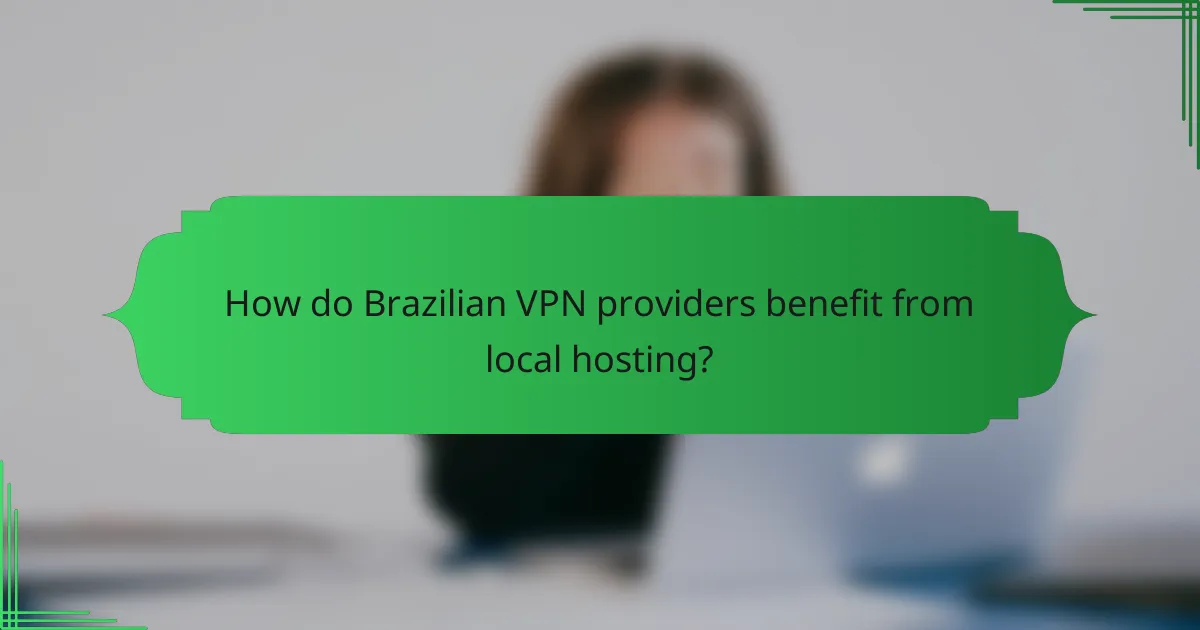
How do Brazilian VPN providers benefit from local hosting?
Brazilian VPN providers gain significant advantages from local hosting, primarily through enhanced performance and compliance. Hosting services within Brazil allows for reduced latency, adherence to local data protection laws, and improved privacy for users.
Improved latency and speed
Local hosting minimizes the distance data must travel, resulting in lower latency and faster connection speeds for users within Brazil. This is particularly important for activities like streaming or online gaming, where delays can significantly impact user experience.
By utilizing servers located in major Brazilian cities such as São Paulo or Rio de Janeiro, VPN providers can ensure that their services operate efficiently, often achieving latency in the low tens of milliseconds. This speed advantage can be a key differentiator in a competitive market.
Compliance with local regulations
Brazil has specific data protection regulations, such as the General Data Protection Law (LGPD), which mandates how personal data should be handled. Local hosting helps VPN providers comply with these laws, reducing the risk of legal issues and fines.
By keeping data within Brazilian borders, VPN providers can ensure they are following local regulations, which is crucial for maintaining trust with their users. This compliance can also enhance their reputation in the market, attracting more customers who prioritize data security.
Enhanced data privacy
Local hosting contributes to enhanced data privacy for Brazilian users by ensuring that their data is stored and processed within the country. This limits exposure to foreign surveillance and data requests, which can be a concern with international hosting solutions.
Moreover, Brazilian VPN providers can implement robust security measures tailored to local needs, such as encryption standards that align with national policies. This localized approach to data privacy not only protects users but also builds confidence in the service being offered.

What are the key features to look for in local hosting?
When selecting local hosting for Brazilian VPN providers, prioritize features such as scalability, security, customer support, and pricing. These elements directly impact performance, reliability, and overall user experience.
Scalability options
Scalability is crucial for accommodating fluctuating user demands. Look for hosting solutions that offer flexible plans, allowing you to easily upgrade or downgrade resources based on traffic and usage patterns.
Consider providers that support both vertical and horizontal scaling. Vertical scaling increases resources on a single server, while horizontal scaling adds more servers to distribute the load, which can be beneficial for VPN services experiencing rapid growth.
Security measures
Security is paramount for VPN providers, as they handle sensitive user data. Ensure that the hosting provider implements strong encryption protocols, such as AES-256, and offers features like DDoS protection and firewalls.
Additionally, check for compliance with local regulations, such as the General Data Protection Law (LGPD) in Brazil, which mandates strict data protection measures. Regular security audits and updates are also essential to safeguard against emerging threats.
Customer support availability
Reliable customer support is vital for resolving issues quickly. Opt for hosting providers that offer 24/7 support through various channels, including live chat, email, and phone.
Evaluate the responsiveness and expertise of the support team. Some providers may offer dedicated account managers for business clients, which can enhance service quality and ensure prompt assistance during critical times.
Pricing structures
Understanding pricing structures helps you choose a hosting solution that fits your budget. Look for transparent pricing models with no hidden fees, and consider whether the provider charges monthly or annually.
Compare different plans to find the best value, keeping in mind that cheaper options may lack essential features. Some providers offer tiered pricing based on resource usage, which can be advantageous for scaling your VPN service as needed.
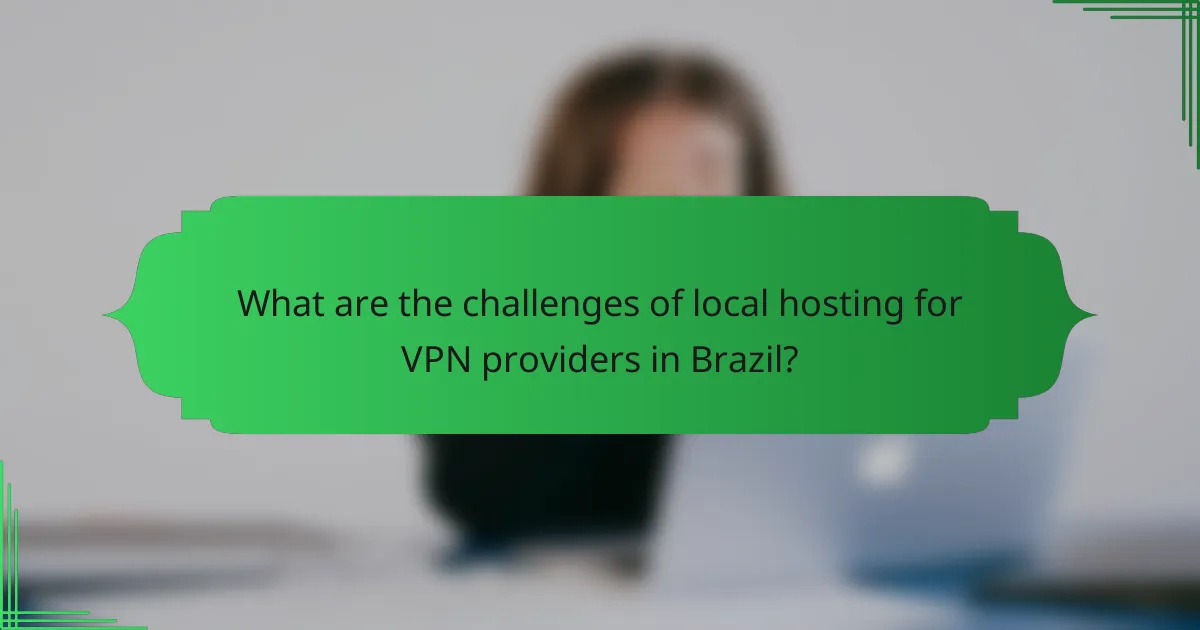
What are the challenges of local hosting for VPN providers in Brazil?
Local hosting for VPN providers in Brazil presents several challenges, including limited infrastructure, higher operational costs, and complex regulatory requirements. These factors can hinder the efficiency and competitiveness of VPN services in the region.
Limited infrastructure in remote areas
Brazil’s vast geography means that many remote areas lack the necessary infrastructure for reliable hosting. This can lead to inconsistent service quality and slower connection speeds for users in those regions. VPN providers must carefully assess the locations of their servers to ensure adequate coverage and performance.
To mitigate these issues, providers can consider partnerships with local data centers or invest in infrastructure development. However, this requires significant investment and planning, which may not be feasible for all companies.
Higher costs compared to international providers
Hosting services in Brazil can be more expensive than those offered by international providers due to factors such as higher energy costs, taxes, and operational expenses. This can lead to increased subscription prices for end-users, potentially reducing competitiveness in the market.
VPN providers should evaluate their pricing strategies and consider whether to absorb these costs or pass them on to customers. Offering tiered pricing or promotional discounts may help attract users while managing expenses.
Regulatory hurdles
Brazil has specific regulations governing data privacy and internet usage, which can complicate the operations of VPN providers. Compliance with the General Data Protection Law (LGPD) is essential, as it mandates strict guidelines on user data handling and storage.
VPN providers must stay informed about local laws and ensure their services comply with these regulations. Engaging legal experts familiar with Brazilian law can help navigate these complexities and avoid potential penalties.

How do Brazilian VPN providers compare to international competitors?
Brazilian VPN providers often offer competitive pricing and tailored services for local users, but they may lack the global reach and advanced features found in some international options. Users should consider factors like privacy regulations, server locations, and customer support when choosing between local and international VPN services.
Pricing differences
Brazilian VPN providers typically have lower subscription costs compared to international competitors, with plans often ranging from BRL 10 to BRL 30 per month. This affordability makes them attractive for local users who may not want to invest heavily in VPN services.
However, international VPNs may offer more tiered pricing options, including free trials or longer-term discounts, which can appeal to users looking for flexibility. It’s essential to compare the features offered at each price point to determine the best value.
Service offerings
Brazilian VPN providers often focus on essential features such as encryption, local server access, and user-friendly interfaces. Some may also provide specific services tailored to Brazilian content, such as streaming local channels.
In contrast, international VPNs frequently offer a broader range of features, including advanced security protocols, multi-device support, and access to a larger number of global servers. Users should evaluate their specific needs to choose the right provider.
Market share analysis
The Brazilian VPN market has seen significant growth, with local providers capturing a notable share due to increasing awareness of online privacy. While international VPNs still dominate in terms of overall user base, local options are gaining traction among users seeking tailored solutions.
Market dynamics are influenced by factors such as local regulations and user preferences for privacy. As more Brazilians become aware of the importance of VPNs, local providers may continue to expand their market presence, offering competitive alternatives to international services.
